Sunday October 6, 2013
Williamsburg, Virginia
I just LOVE Dr. Seuss books.
I remember as a child going into the library and making a beeline for the bottom shelf in the children’s section where the Seuss books were kept. There were many of his books even in those dark ages but they were almost always out. I would grab up whatever was left and read them AGAIN. There were some I never got to read until I was an adult since they were always out.
So what does this have to do with Williamsburg. Well……….Thing one and Things 3,4 and 5 were visiting today. Apparently Thing 2 was probably taking a well deserved break having to deal with 4 guys all the time. But isn’t this great!! They posed for me and told me their names and of course I don’t remember even one of them.
As we walk toward the historic district we see two other 21st century walkers.
BEAGLE ALERT!
Walking your goats on a Sunday morning? I doubt that was an 18th century pastime.
Back in the 18th century they aren’t wearing anything as skimpy as shorts and t-shirts in 89 degree weather.
The sign on the shop says Weaver but inside they actually do spinning, dying and weaving. Those arts were the textile skills of the 17th and 18th century. Here the young woman is spinning cotton she has just de- seeded.
She spins, drawing fibers and twisting them tightly to form thread or yarn. Spinning wheels had come from India to Europe during the Middle Ages. Williamsburg's weavers demonstrate two types: a walking wheel for cotton and a Saxony wheel for flax, hemp, and wool.
She shows us cotton right from the plant and in one tiny little ball there are 5 seeds. I try to take them out. They cling and it is more difficult than I thought.
Cotton she tells us is much more difficult to use for cloth than either linen or wool which are easier to clean and to spin.
It was necessary to master mixing dye recipes and dyeing yarn. Because each type of fabric requires a different approach, dyeing requires knowledge and care.
Many ingredients came from Spanish colonies in Central and South America. Eighteenth-century dyers used insects to produce red, indigo for blue, campeche tree heartwood for purple, walnut for brown, and turmeric for yellow. Because of their chemistry, many eighteenth-century dyes are these days deemed unsafe, but Colonial Williamsburg uses harmless authentic formulas. Their collection is so large they can produce any color known in the 1700s.
Need a new dress? Just take the old one to the weaver.
Not only did the shop dye clothes, giving last year's fashion a new life, but it did dry cleaning, spot removal, and fancy pressing. You could bring in your yellow dress, dye it blue, take it to the milliner for new trims and voila, a new gown. Men also dyed their jackets, breeches and waistcoats.
18th century colors don’t look that different from those we use today although there aren’t quite as many hues.
Colonial Williamsburg's weavers turn out cloth with two types of looms that represent the types available to eighteenth-century Virginians. The smaller is a cantilever loom, developed during the eleventh century in Spain. The larger is a four-post box loom, created in England in the sixteenth century. Outside the home, the carding and spinning were done by women and the weaving by men.
Spinning and weaving have always seem very relaxing activities to me.
In the garden next door I wonder if any of the plants are those used for dying.
Back out in the street there seems to be quite a stir.
This man is stopping people and encouraging them to move on to the Palace Green. Something about the magazine.
Lots of talk as we walk on up Duke of Gloucester street.
He draws small crowds and is quite impassioned about his concerns.
After all his effort to stir up the people we think we’d better head over to the governor’s palace and see what is happening.
This woman is hurrying up the street in the opposite direction.
This man seems not at all concerned or perhaps he is worried.
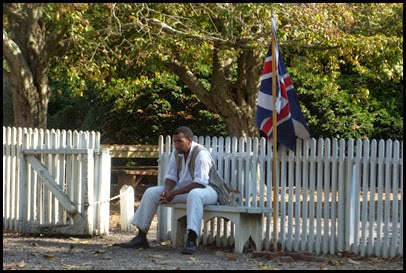
As we get near, we don’t see many others heading this way or much going on when we get there.
We decide we’ll stick around and just stroll through the palace grounds. We notice the carriage house. The governor definitely has some fine traveling carriages.
The wagon must be used by his staff.
Through this gate are the gardens. When we walk further in we hear voices.
Near the back people are watching an exchange between the governor and his staff. The governor is none too happy with the talk he’s been hearing around town.
The governor asks that his Virginia Gazette Newspaper be brought and when he reads about the Day of Fasting and Prayer called for by the House of Burgesses in solidarity with The Massachusetts Bay Colony which is being embargoed in retaliation for the tea party, he determines to go immediately to the Capitol and dissolve the burgesses.
Well now that is only going to add fuel to the fire.
We decide against following along for that altercation and instead continue our walk through the gardens.
Not many things are in bloom in the fall but it is lovely just the same.
I want to walk through the maze but then we hear voices, a lot of voices, coming from the front of the palace.
People are coming from all directions now. Quite a crowd has gathered.
It appears the powder has been stolen from the magazine last night. Some, including the man we saw earlier, are accusing the royal governor, and wish to storm the palace, others wish to wait until Mr. Randolph comes to decide what course to take.
Mrs. Jefferson pleads for them to wait for Mr. Randolph, Virginia’s most influential politician and president of the Continental Congress.
“Why shall we wait” he asks. “We are now unarmed. It is our powder not the crown’s. How dare they come in them middle of the night and steal it.”
The situation escalates.
Things get more heated when the members of the Williamsburg Independent Company arrive extolling the crowd to join them in storming the palace to demand the return of powder.
Tempers flare.
The call to arms is given.
But cooler heads prevail as the town mayor and Mr. Randolph arrive.
The company members are persuaded to allow Randolph to speak with the governor requesting the return of the powder. Somewhat disgruntled, they leave the green.
On lookers are of varied opinions clearly.
Peyton Randolph and the mayor form a delegation to visit the governor seeking an explanation.
Dunmore, claiming he secured the powder to protect it from a rumored slave uprising, threatens to arm the slaves and burn the town if townspeople cause further disturbance. Good Grief!
Nothing is accomplished and the Governor says he is finished. As he walks away Randolph echoes, “We certainly are”.
It seems clear that war is inevitable and the governor had best beware.
The gates are locked. The people are confused.
And we are hungry.
What will happen next?
Who knows.
I was hoping to see inside the palace.
Now I wonder if I will even be able to get back into the gardens to walk the maze.








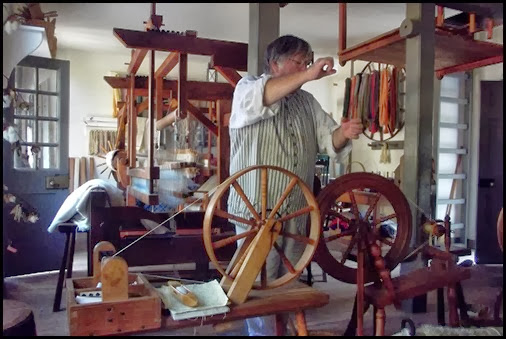

















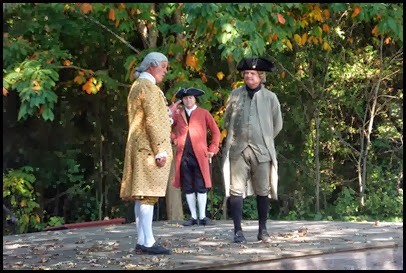





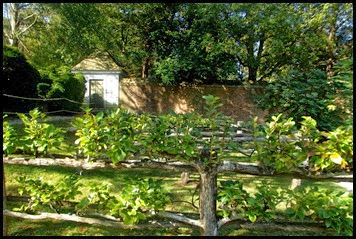

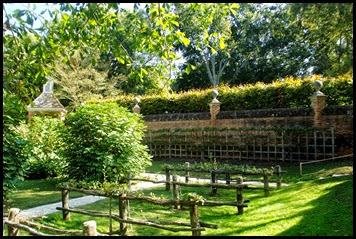
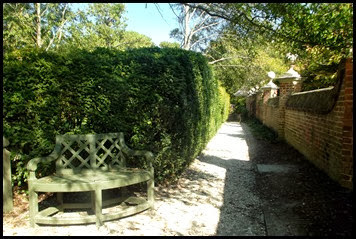
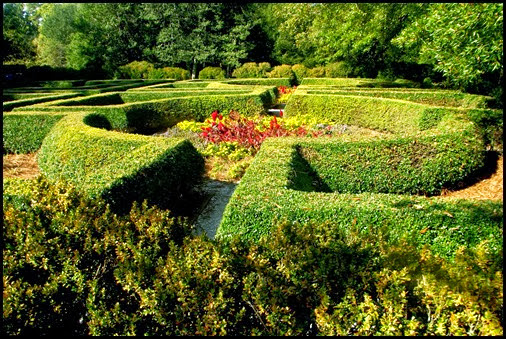


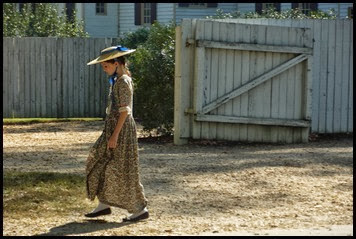



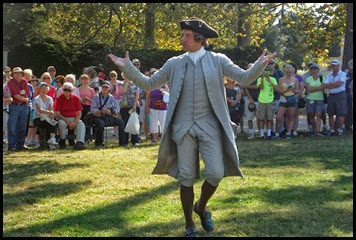







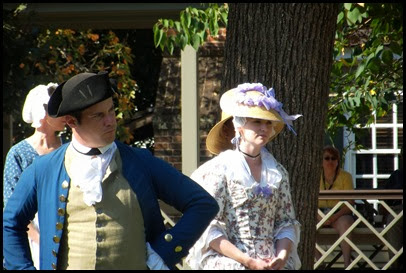






Uh oh! You'd better be careful not to be caught in the middle of all this quarreling! Don't want to see your travels interrupted. ;c)
ReplyDeleteWe're keeping a low profile Paul but thanks for the reminder!
DeleteThanks for posting with pics and descriptions of most things I forgot since last Fall. That is a wonderful place to learn how not too long ago, we were not a country. Should be a required school trip.
ReplyDeleteYou're welcome Tom. I could definitely come back here during a different season each year if I were in the neighborhood.
DeleteYou are definitely into the re-enactments at Williamsburg! It is amazing how much history comes to life when it is acted out.
ReplyDeleteHope you made it back to the maze.
Hi Pam,
DeleteThere are wonderful re-enactments every day and they repeat so you don't have to try to do them all on any one day but you'd have to be here at least a week to do them all. I know they change them but wish I'd asked how often, monthly? seasonally?
This town is a full scale, living breathing diorama… Besides the Tao of Pooh and Bugs Bunny … Dr. Seuss is m'man…. I think we have every single book he ever wrote. Just quoted him in a post yesterday or day before… CRS
ReplyDeleteGreat pictures, as always, Sherry ;)
I'm so glad you like the pictures Carolyn. It really is a full scale diorama and I've loved being here. Definitely on my return list.
DeleteMy Lord, seems you've dropped yourselves into the middle of a real skirmish. Hope they didn't close all the restaurants.
ReplyDeleteLove seeing all that gorgeous hand spun and dyed yarn.
HA! Gaelyn, great comment. I don't think anything closes the restaurants then or now. The hand spinning, weaving and dyeing really was wonderful all around. Just saying the words is relaxing isn't it.
DeleteWilliamsburg sounds like an interesting place, how many days does it take to get through this entire place? I wonder if the actors are volunteers or paid employees. I'm going to do some research.
ReplyDeleteTeri, there are some of both full and part time employees and volunteers. There are many tour guides for the houses and carriage tour guides. I could easily have spent at least a week in order to see all the reenactments and visit all the shops and have time to talk to all the craftsmen and walk all the streets. There was much left to do when we left after 4 days. I think each season has different stories so that people can see something new if they come often.
DeleteFun post!! Another great story about our history brought to life:o)
ReplyDeleteBut... Do you like Green Eggs and Ham?!?! ;o))
Well since I used to have chickens I know that green eggs are not good unless they are scrambled and colored with food coloring. I wonder if the Irish do that like they do beer on St. P's day?
Deleteabsolutely loving it. . .hope you get to go back and do the maze!
ReplyDeleteI am glad you are along on this fun adventure Janice. Next stop, hopefully the maze.
DeleteNever knew there was so much there. Loved the things, hope your weather is holding ours is heading down in the 20's tonight :(
ReplyDeleteOh no, the 20's.....hope you've got lots to keep you warm. The weather here has been great but rain is coming up. I'm revising my estimate, to do it all would take 7 to 10 days at a leisurely pace.
DeleteAnother fascinating post. Especially intrigued by how the weavers spun and dyed fiber. Great idea to take old clothes in to be given a new life. Just trying to imagine having to wear all of those layers of fabric in 89 degree heat!
ReplyDeleteThanks Terri I'm glad you are enjoying it as much as I am. The weaver's shop was one of my favorites. The heat and all those clothes is definitely one of the things I think about when I'm wondering if I would have liked living then. That and the position of women in the society.
DeleteGreat costumes everywhere, and so much real drama. They did have a LOT to rebel about. I would not have wanted to volunteer to fight the British, but I sure would help felt the need for it.
ReplyDeleteOf course we are only hearing one side of the story since King George isn't here to tell his side. Glad you haven't had to volunteer for any fights.
DeleteI continue to learn so much from your blogging. Is there any way to determine how often they 'reset' their time frame of the period circumstances? Do the 'townspeople' live in the houses, or 'show up' in costume at a set hour every day?
ReplyDeleteWelcome Barbara, I'm glad you feel you are learning something. It makes this effort worth while. I"m so glad to hear from you. I couldn't find an email address to get back to you about your questions. I know that they do different "scenarios" each year and that one of the biggest days for reenactment is July 4. People do own houses in the "historic area which is many blocks square. Those who are in "costume" work for Colonial Williamsburg and assume a researched historical identity. Many of them have been there for years like the weaver who has been weaving for 30 years. Others are just hired to be townspeople and they move from place to place manning the gates and doorways and other sorts of things. Lots of part time positions I would think. Hope you'll comment often. It's great to know you are out there.
DeleteI always thought it would be so wonderful to be able to spin and weave. I still wish I could.
ReplyDeleteI had a small loom at one point and wove some placemats and really liked it. The spinning and weaving takes a long time and the equipment takes up a lot of room. Not to mention looms are expensive. But aren't they beautiful?
DeleteWhat an interesting reenactment.....entertaining. The spinning, dyeing, and weaving of the yarn had to be interesting. We went to an Alpaca Farm and saw the process of turning the wool into yarn. Loved all your photos.
ReplyDeleteSo glad you are enjoying Williamsburg with me. It's an interesting process seeing cotton or linen or wool turned into yarn. I have an Alpaca short cape that I just love. It is light weight but SO WARM and soft.
DeleteGreat story telling! Impressive that you remember the lines. :) The costumes are great! Your pictures really capture the drama. Must be fun to act it out. The people look so 'in character'-what fun! I enjoyed this blog :)
ReplyDelete